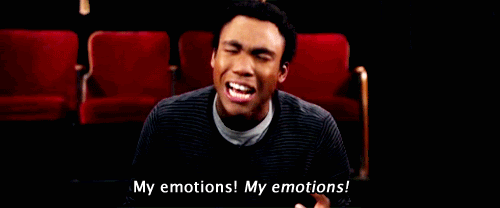
Okay, so let’s get it out front that we all have a lot of feelings about stuff.
Proceeding from there.
Nathan Jurgenson and David Banks have already writted excellent responses to Nicholas Carr’s very thorough and interesting critique of Cyborgology’s own criticisms of the concept of digital dualism – and all are well worth reading (there are additional links to more great responses here as well). What I want to offer here is my own take on a couple of the criticisms Carr offers, as well as an apparently-needed clarification to some of what I’ve said in the past. And, again, what it really comes down to for me is feelings.
One of the issues Carr takes with his understanding of a lot of what we’ve written is that – he feels – we don’t take seriously enough the persistent digital-dualist assumptions of many people. That, content to call digital dualism a “fallacy”, we write off or otherwise dismiss it when, time and time again, people think and speak and behave in ways that indicate digital-dualist understandings of how reality looks and works. People, Carr argues, hold to these ideas because they feel, on a very fundamental level, that they are correct – more than correct, in fact: they feel that these ideas are true. And Carr takes Nathan to task for assuming that this is all a self-aware pose:
[P]eople really do feel a difference and even a conflict between their online experience and their offline experience. They’re not just engaged in posing or fetishization or valorization or some kind of contrived identity game. They’re not faking it. They’re expressing something important about themselves and their lives—something real. Jurgenson doesn’t want to admit that possibility.
Carr is right to argue that the feelings of many people regarding digital dualism are worth taking seriously. But I don’t think anyone at any point has tried to suggest that most people are engaged in any form of fakery. In fact, I’d argue that it’s because these feelings are so deep and fundamental and visceral – in the guts, in the flesh, because bodies matter – and therefore so persistent, that they’re worth serious question and criticism. Why would we expend so much time and energy writing about something that we could easily dismiss as false?
When we talk about digital dualism, when we engage in a debate about what augmented reality is and means, what we’re dealing with is not abstract, nor should we view it that way. We’re dealing with the stuff of reality, or at least of reality as we experience and understand it, which is the only kind of reality with which we can meaningfully deal. What we’re arguing about goes beyond semantics or phraseology and to the core of how we make sense of who and what we are. What we need to ask is whether or not digital dualism is a useful conceptual framework with which to engage reality. Does it bring us to a deeper understanding of ourselves and our lives? Or does it obscure important truths?
Clearly we Cyborgologists come down in a particular place there.
Carr goes on to write that the persistence of these feelings – deep convictions that not only is there something deeply different about the digital and the physical, but that one realm is actually invading another – can be explained by recognizing that this invasion is actually happening, that people are sensing that the enmeshed nature of the digital and the physical is costing them something:
The reason people struggle with the tension between online experience and offline experience is because there is a tension between online experience and offline experience, and people are smart enough to understand, to feel, that the tension does not evaporate as the online intrudes ever further into the offline. In fact, the growing interpenetration between the two modes of experience—the two states of being—actually ratchets up the tension. We sense a threat in the hegemony of the online because there’s something in the offline that we’re not eager to sacrifice.
First of all, I think pretty much everyone on this blog would hold that viewing the relationship between the digital and physical in hegemonic terms is a problem in itself; it implies a kind of zero-sum conceptualization of the two, that more of one is less of the other, or at the very least that more of one subsumes the other, which is one of the defining features of the digital dualist thinking with which we disagree. But further, I want to point out that the tension Carr is describing isn’t new – and isn’t necessarily what he thinks it is.
We’ve been thrown into precisely these kinds of crises before whenever something comes along that requires us to reorder our thinking about our lived reality, about how we navigate it and what it all means. The fact is that we as thinking, storytelling creatures have a long history of anxiety around what’s true and real and an equally long history of instinctively trying to protect those categories. We want what we know to be what we know, and when what we understand as legitimate and real falls into flux, we react with instinctive and mostly unexamined panic, circling our epistemological wagons. Just because there’s tension now over us having to redefine the categories by which we understand reality doesn’t mean that the need to redefine isn’t there.
Finally, I want to end with a specific mention Carr makes (in the comments section of his essay) of a post of mine on my own gut-level digital dualist feelings regarding print books versus ebooks. Carr congratulates me for having the self-awareness to write the post to begin with, but criticizes me (and the rest of us) for not going far enough:
At least they’re consistent in applying their theory to themselves, but it would be nice if they interrogated their own reactions and feelings a little more deeply before dismissing them because they don’t fit the theory.
I appreciate that Carr wants us to interrogate ourselves deeply – he and I are in complete agreement on this point. But I take issue with the suggestion that I wasn’t doing exactly that, or that I was “dismissing” anything (and dude, do you really want more navel-gazing from me? There was that time I made a very pretentious post entirely about Livejournal). What I was exploring in that piece was why these ideas are so persistent and so visceral, and what the challenges inherent in dealing with them are, with myself as case study. What I was saying was that in order to engage with digital dualism, we need to understand the deep, intuitive ways in which people experience it. We need to recognize that their understanding of their experience is legitimate to them, even if we don’t think it’s a useful one at the end of the day. Carr is correct: Only when we do that can we start to have a productive discussion about why it might not be useful, and why it may be important to take a different approach. I meant that post to be the start of a much larger discussion. So let’s discuss.
Let’s talk about all our feelings.




Comments 10
Boaz — March 7, 2013
Sarah,
I've been reading these posts with interest, and posting on Carr's blog and on Frailest Thing blog in response to some of this stuff.
My own take on this is that the concept of "digital dualism" represents somewhat of an overstep.
You write: "What we need to ask is whether or not digital dualism is a useful conceptual framework with which to engage reality." The way this issue is framed is in terms of “digital dualism” versus “augmented reality”, and the discussion of this often turns into a question of the distinction between atoms and bits. I think this is where you get into trouble. You want to talk about the distinction or similarity between atoms and bits, but without talking about atoms or bits!
Well, an atom has a nucleus, with varying numbers of protons and neutrons depending on the element, and is orbited by the same number of electrons as protons. Atoms have energy spectra that may be computed using quantum mechanics, and observed via the emitted photons using various photograph-like media.
Bits, on the other hand, are an abstract representation of the basic elements in a message. One considers the set of possible bits within the framework of probability theory or statistics usually. One can then talk about the entropy of a set of bits.
At such a low level perspective, one could have a clear discussion about the similarities and differences between atoms and bits. One could take the framework of statistical mechanics, which comfortably includes both atoms and bits. We can compute the expected number (bits) of Hydrogen atoms (atoms) in the first excited state at a temperature of 80 Kelvin, for example.
But to have a discussion about the distinction between atoms and bits at the level of distinction between offline and online experience seems poorly matched. To describe myself in terms of atoms, or the words I speak, or type in terms of bits are both rather reductionistic, and unlikely to add clarity to the phenomenon under question. I’d like to see the concept of digital dualism pared down and its scope determined more clearly (as Saccassas also wrote in recent post on his Frailest Thing blog (http://thefrailestthing.com/2013/03/02/onlineofflineno-line/). I like his idea to focus on a few concrete questions. He poses the scenario, for example, of considering whether to get together with someone you care about in person, or to interact from a distance via phone, skype, email, etc. What would be the “digital dualist” vs. the “augmented reality” positions on this scenario? Are these really such distinct categories?
In thinking through why I may choose to visit my brother in person in addition to calling him on the phone, if I had to think it through in terms of atoms and bits, I think I'd have a remarkably hard time. At some level, yes, its a question of whether we simply exchange bits over a digital network, or whether we get our atoms in close proximity. But this is such a reductionist perspective, that its pretty hard to get very far with it. The kind of answers one comes up with are that the face to face interaction is "higher bandwidth", which though perhaps true, I don't think gets one very far.
When we feel like some digital communication based technology is changing ourselves, or threatening something we care about, does it help to say that we are being “digital dualist” about it? When I find fewer libraries, and am pushed to do more and more things via screens, is the sense of loss I feel well treated by asking whether I am a digital dualist or an augmented realist? It doesn’t seem like the distinction between atoms and bits is the right kind of analysis to think through these questions and allow critical analysis that gives us more choice and ability to resist those aspects of society and technology that may be harmful to us.
Hope this made some sense, and may be in some way helpful.
-Boaz
Friday Roundup: March 8, 2013 » The Editors' Desk — March 8, 2013
[...] All My Digital Dualist Feels on Cyborgology [...]
» the Digital Dualism debate MePhiD — March 8, 2013
[...] all for tonight, folks. Tomorrow, all the digital dualist feels and [...]
» the Digital Dualism *Discussion*, Part Three MePhiD — March 10, 2013
[...] All My Digital Dualist Feels by Sarah Wanenchak » Cyborgology, March 6, 2013 An additional response to Carr, both complimentary and critical. Admittedly, this is the post that really got me into exploring the topic further. What can I say…I like talking about feelings. [...]
Dude-ly Digital Dualism Debates » Cyborgology — March 11, 2013
[...] links to Banks’s and Jurgenson’s responses to Carr, then responds to Carr’s accusation that critics of digital dualism have neglected to consider people’s feelings and emotions. She [...]
Categorical Configurations and The Dualism Debates » Cyborgology — March 21, 2013
[...] to augment. Cyborgologists have worked furiously to address these points, arguing about the role of bodies and emotion, correcting misleading characterizations, clarifying linguistic ambiguities, reintroducing the [...]
Materiality Matters: Confronting Digital Dualism with a Theory of Co-Affordances » Cyborgology — March 21, 2013
[...] the work phenomenologist Judith Butler to the digital dualism debate), and Sarah Wanenchak (in discussing the “feels” of digital media) adopt a phenomenological approach without labeling it as [...]
Death and Mediation » Cyborgology — December 30, 2013
[…] no desire to start arguing with people about digital dualism. As Sarah Wanenchak in particular has written, sometimes feelings are digital dualist—and that’s just how it is; being based (in part) on a […]